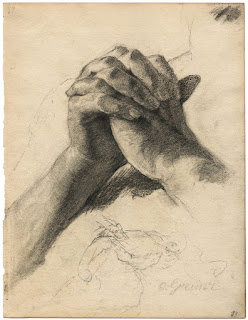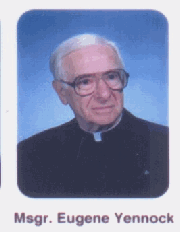Monday Musings - Imagine God Embracing You While You Pray!
 |
| (Image source: Wikimedia Commons) |
Nearly a year ago,
I shared a brief article on prayer – a gift I received while on retreat at
the Abbey of Genesee. That post was
well-received. You
can read it here.
If you read that
simple reflection, you will understand what a blessing it was for me to return
to that special place a few weeks ago and to hear Father John Denburger,
O.C.S.O. discuss prayer once again.
Father did not
disappoint. Underlying all prayer, he told us, is God’s decisive love for each
of us.
During the course
of his presentation, this soft-spoken and insightful teacher drew a distinction
between two types of prayer: maintenance and spousal.
“Maintenance
prayer,” he said, “is that which gets me through the day, helps me to do this
or that, or to ask for this grace or that benefit, etc. This type of prayer has
value and is okay.” But it is not enough. “It has no room for conversion
because I am not thinking of my relationship with God but asking for something.
Therefore, we also need Spousal prayer – “prayer that draws us into an intimate
relationship with God.”
It should be obvious that we cannot develop
much of a relationship with the God we profess to love if we rarely speak to
Him. “Religion,” Father said, “is an intimate relationship with God, not a
second hand experience.” Prayer therefore cannot be sporadic.
“The Psalms,”
Father stated, “are both prayer and
a teaching on prayer; they are theology but in prayer form.” Unfortunately,
many of us who pray the Liturgy of the Hours often do so distractedly,
inattentively and negligently”. As a result, we miss the lessons being taught.
To buttress his point, he shared two Psalms.
The first was Psalm 27:8-9:
Of
You my heart speaks; You my glance seeks;
Your
Presence, O Lord, I seek:
Hide
not Your face from me.
Do
not in anger repel your servant.
You
are my helper; cast me not off;
Forsake
me not, O God, my Savior.
He told us to look
at Psalm 119 the longest of the Psalms – 176 verses. The first three verses
refer to God as “Him” Then something happens. From verse 4 and thereafter God
is referred to as “You”. “God,” he exclaimed, “has become personal to the
psalmist.” Our Lord “desires to be with you and me…Prayer is a very intimate
act between lovers – Lover and lover."
God must become
personal to each of us!
Among other
additional lessons on prayer we may have missed while reciting the Psalms
inattentively, distractedly or negligently, Father suggested these two:
“Even when we feel nothing while praying, the Holy
Spirit penetrates our soul while we pray – even when we are not aware of
it."
and
“Feelings in response to our prayer are not necessary;
they are mere icing on the cake should we be blessed with some.”
But how do we get
to the type of prayerful intimacy that Jesus seeks with us flawed and sinful
souls? Father suggested that we imagine God embracing us during prayer!
This image of an
embracing God appeals to me. It came to Father one day while he was reflecting on Jesus’
interaction with lepers. In Jesus’ time, as we know, lepers were required to
keep their distance from those considered clean. No Jew would ever approach,
let alone physically touch a leper.
Yet Jesus did
both. In order to touch that diseased and ostracized soul, Jesus had to first
walk up to him. Such conduct would have shocked those who observed Jesus doing
so. Actually, Father imagined Jesus going further than merely touching the
leper. He saw Jesus embracing the leper as did the Father upon the return of the
prodigal son.
Why would God do
less to one seeking an intimate prayerful and personal relationship with Him?
To help us enter
into a similar frame of mind during prayer, Father challenged us to ponder and
keep these two additional thoughts ever in our mind:
“I would not be praying unless God was embracing and
inviting me into prayer.”
and
“Before I even make the Sign of the Cross, Jesus has
embraced me!”



Comments